Hannah Snider's Blog
Join the World’s Largest Live-stream Meditation with Jon Kabat-Zinn
![]()
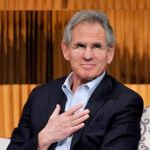
I hope you’ve been enjoying the wealth of content and information presented through The Mindfulness Summit. I can’t believe it’s the end of October already! What an amazing group of teachers that have shared throughout this past month.
There’s still one more fabulous meditation to come. Jon Kabat-Zinn, the man often credited for bringing mindfulness to the west, for the final meditation live-stream today (Saturday October 31st) at 5pm EST. Jon is the bestselling author of many books, and the creator of the Mindfulness Based Stress Reduction (MBSR) program, which has led to the development of numerous other programs, including Mindfulness Based Cognitive Therapy (MBCT).
Jon is an authentic practitioner and teacher of mindfulness, and it is beautifully fitting for him to lead us in the final meditation. Join me and hundreds of thousands of others around the globe as we tune in to the present moment together. Events like this provide me with optimism and hope. Practicing mindfulness helps develop an increased capacity for self-compassion and non-judgmental awareness. I believe the implications for the individual and the world at large are huge…
Register here: http://themindfulnesssummit.
If you’ve missed some or all of the talks/meditations, and would like to purchase/own them, click on ‘buy full access pass’ (net proceeds go to mindfulness based charities).
With gratitude,
Dr. Hannah
The Mindfulness Summit: A FREE online event you don’t want to miss
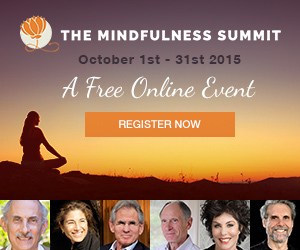
I’m excited to let you know about The Mindfulness Summit 2015, a FREE 31-day online summit this October, giving you the tools to transform your inner world, integrating mindfulness into your daily life.
The Mindfulness Summit, a not-for-profit project, hosted by Melli O’Brien (of Mrs Mindfulness) is hosted online between October 1-31st, giving participants access to 31 of the world’s leading experts on meditation and mindfulness, for a series of high-quality mindfulness training, online interviews, practice sessions, mindfulness tips and lessons.
Join Ruby Wax, Jon Kabat-Zinn, Jack Kornfield, Tara Brach, Joseph Goldstein and more as they share their tips, stories and some of the best ways to incorporate mindfulness into your life.
If you were to describe your life at the moment, how many of us would use the word ‘busy.’ How many of you have never ending ‘to-do’ lists? If someone asks you how you are – How many of you would reply ‘Good….but busy.’ Why are we so obsessed with packing our schedules, thinking a mile a minute, rushing around with no time to stop and smell the roses? There is an obsession with needing to do something all of the time, a cultural badge of honour. It’s not unusual to wake up and scroll through your feeds before even saying ‘Good morning’ to the person lying next to you, or checking in with yourself.
As a society we have never worked more hours in a week than we do now; we have never pushed ourselves so hard. Our list of things ‘to do’ never ends – it just keeps getting bigger. And are we happier for it?
When was the last time you just sat and did nothing? Reflected? Took time out for yourself just to ‘be’?
If this resonates with you or you’ve ever found yourself feeling stuck in cycles of stress, dissatisfaction and discontent, or unsure how to simply relax and find some inner peace, then the practice of mindfulness is for you.
Mindfulness is the art of living in the moment, rather than 2 minutes ahead or 2 weeks behind. This style of thinking allows you to wholly experience everything in your life; taking time to focus on the present. The benefits don’t stop there. It’s also been found to reduce cortisol (the stress hormone), it allows you to handle stress better, and more recently, ‘mindful eating’ has been linked to weight loss.
So, how can I get involved?
The Mindfulness Summit is a not-for-profit project, with a mission to make mindfulness mainstream. The summit aims to create a global community of people bringing mindfulness into their lives, whilst making a positive impact on the lives of others. This is why all monies raised from the summit project will be going to mindfulness based charities, including Breathworks, The Oxford Mindfulness Centre and Mindfulness in Schools; charities all working in the field to further mindfulness research and teaching.
As part of the 31 days of mindfulness, you’ll also be given tips for mindfulness, wellness and meditation, as well as small challenges throughout the month – and these are all designed to be easy, accessible, and something you can slip into your daily routine.
You will learn how to transform your inner world to a place of wholeness and ease, handling life’s challenges with more wisdom and skill. By the end of the summit you will have learnt how to integrate mindfulness more fully into daily life.
Stop being ‘busy’ for the sake of being busy. Be still. Recharge. Re-engage. Your mindfulness journey starts now.
How It Works:
- Every day in October there will be new interviews, presentations and meditations sessions uploaded to TheMindfulnessSummit.com
- Register for free here to gain access to everything
- Use the hashtag #MindfulnessSummit to join in on the conversation – see what other people are saying and get involved.
- Become a more mindful version of you!
Wishing you all many mindful moments throughout October!
My favourite Mindfulness Resources
People often ask me for suggestions of the best mindfulness resources. It can be daunting to choose amidst the abundance of options available.
Here are some suggestions both from me, and from participants in my Mindfulness Based Cognitive Therapy (MBCT) groups. Check these out and see what resonates most with you. My personal favs: Brene Brown’s “The Gifts of Imperfections” (highly recommended for recovering perfectionists like myself), and The Mindful Way Workbook (the workbook I use to guide my MBCT groups).
MINDFULNESS MEDITATION APPS:
BOOKS: Depression and Self-Compassion
The Mindful Way Workbook: An eight week program to free yourself from depression and emotional distress. John Teasdale
Uncovering Happiness: Overcoming depression with mindfulness and self-compassion. Elisha Goldstein
The Mindful Way through Depression : Freeing yourself from chronic unhappiness. Mark Williams
The Mindful Path to Self Compassion: Freeing yourself from destructive thoughts and emotions. Christopher Germer
Self-Compassion: Stop beating yourself up and leave insecurity behind. Kristin Neff
The Gifts of Imperfection: Let go of who you think you’re supposed to be and embrace who you are. Brene Brown
BOOKS: Anxiety
A Mindfulness Based Stress Reduction Workbook for Anxiety. Bob Stahl, Forence Meleo-Meyer, Lynn Koerbel.
The Mindful Way through Anxiety: Break free from chronic worry and reclaim your life. Susan Orsillo, Lizabeth Roemer.
Calming Your Anxious Mind: How mindfulness and compassion can free you from anxiety, fear and panic. Jeffrey Brantley.
BOOKS: Chronic Pain
You are Not your Pain: Using mindfulness to relieve pain, reduce stress, and restore well-being, an eight week program. Bidyamala Burch, Danny Penman
What is Your Relationship with Food?
I have been interested in Mind-Body medicine for many years. My interests have taken me in many different directions – to medical school, to Mindfulness and Psychotherapy programs, to Dr. Lissa Rankin’s Whole Health Medicine Institute, and to many more fascinating educational ventures. These have served me on a personal level, and have become an integral part of my professional practice.
I find it exciting to discover common principles underlying so many successful approaches to improved health and well-being. One of my more recent explorations is the field of Eating Psychology. This exciting field integrates so many important discoveries of psychology, mindfulness, nutrition, and whole health.
Read on to discover how exploring body image and eating habits can jump start your journey to wellness!
What is your relationship with Food? Does your relationship to food run your life? Does it cause you suffering? Do you worry about what you eat? Do you eat when you worry? Do you eat in response to loneliness or sadness? Perhaps you eat to avoid other types of suffering. Or perhaps you’re just looking to create healthier eating habits.
In a world where obesity is increasing at an alarming rate, and the dieting industry is at an all time high, it’s time to rethink the way we approach nutrition. We may know what we ‘should’ be eating, but it can be incredibly difficult to make and sustain these changes.
99% of people who successfully lose weight, gain it all back within the year.
Something is seriously flawed with the dieting industry! So what is holding so many of us back? Often times limiting beliefs including self-critical beliefs and feelings of unworthiness, or avoidance of longstanding hurts, can block sustainable weight loss and health goals.
Marc David, from the Institute for Eating Psychology, has created a new field called Mind-Body Nutrition. This seems to incorporate many of the mind-body principles with which I strongly agree. He discusses the importance of addressing not just WHAT we’re eating, but HOW we’re eating, what is underlying our drive to eat, and how we FEEL while we’re eating food. He uses an approach that encourages seeing body image and eating challenges as opportunities for growth – opportunities to lean into underlying patterns that are in need of healing. In this process, weight loss and physical health can be secondary bonuses to a more deeply transformational process.
WHAT we eat is only ½ the story. It’s also important to understand WHY we eat, HOW we eat, and what we THINK while we eat.
Nutrition, the way our body intakes, digests and assimilates food is much more complex than we have typically acknowledged. Max Stanley Chartrand, PhD, explains this in his Human Digestion Process Flow Chart (accessed Feb 9, 2015). He explains that our nervous system responds to signals of stress in a way that impacts our ability to digest the food we take in to our bodies. Worry, fear or anxiety inhibits the body’s secretions and prevents food from digesting properly and nutrients from absorbing optimally. Cortisol (our stress hormone) impacts the way the body takes on calories and gains weight.
This is SO incredibly important, so let me repeat: How we FEEL, and what we THINK as we are eating, impacts the way the food is absorbed and processed in our body. It may impact weight gain as well. So if we reach for a piece of chocolate, and tell ourselves “I’m going to get fat” or “I’m so ugly” or “I have no self-control” or “This is going to make me sick”, these thoughts and feelings that go along with them, translate into the stress response within the body, and ultimately the way the food is digested and deposited within the body.
This is one of the many reasons I love mindfulness.
When we bring mindful awareness to the present moment, we learn to eat in a different way. We bring true awareness to the food while we’re eating it. We take more time to eat. We bring more gratitude and appreciation into the eating process. We learn to focus on eating, and not on the million other things we are stressed about. So not only can this be a much more enjoyable way of eating, and a way of reducing our stress, it turns out it also impacts how the food is digested and processed in our bodies.
Talk about Win-Win!
So next time you find yourself reaching for a food you feel is ‘less than healthy’, pay attention to how you feel. What are you thinking? What emotion might you be avoiding? Maybe you’ll choose not to eat it. And if you choose to eat it, allow yourself to savour, to enjoy and appreciate it with all your senses!
For more information, check out Marc David’s Institute for the Psychology of Eating at www.psychologyofeating.com.
In health,
Dr. Hannah Snider
Brené Brown: The power of vulnerability
Brené Brown studies human connection — our ability to empathize, belong, love. In a poignant, funny talk, she shares a deep insight from her research, one that sent her on a personal quest to know herself as well as to understand humanity.
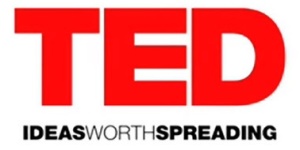
Definitely a talk to share.
Whole Health Quiz: Discover your healthcare priorities
Happy New Year and welcome to 2015!
This time of year inspires change and new beginnings. Especially when it comes to our health and happiness. We often find new motivation to live the lives we desire, and courage to make this happen.
Perhaps your health habits need a little tweaking here and there, or perhaps a complete overhaul. In either case, in addition to the more common diet and exercise factors, optimizing our health involves reducing modifiable stress factors, and increasing the number of healing relaxation responses. In fact, more than 70% of health conditions are estimated to be related to stress! Check out Harvard’s Centre for Mind-body Medicine and the extensive research here.
Though this is not a substitute for a physician consultation, if you’re interested in what might be underlying or contributing to your current health condition, or are just looking to optimize your health, go ahead and take this whole health quiz (based on Dr. Lissa Rankin’s Whole Health Cairn from her book Mind over Medicine). By becoming aware of the areas in your life that elicit most of your stress, as well as the potential areas that could help increase your relaxation response, you have the opportunity to make your body ripe for health and healing.
Dr. Hannah Snider
Next Mindfulness (MBCT) Group dates
I am pleased to be offering two Mindfulness Based Cognitive Therapy (MBCT) groups this coming winter and spring.
Upcoming Sessions:
Thursday evenings 6-8:15pm, January 22 -March 12, 2015
Thursday mornings 10:00am-12:15pm, April 1-May 20, 2015
If interested, please register and follow the outlined steps here.
Warm wishes,
Dr. Hannah Snider
What is Mindfulness?
Mindfulness is a word that is showing up more and more frequently within our modern culture. This concept, however, is far from new. It has been around for thousands of years, though it is only within the past 30 years or so, that this concept has made its way into western culture and medicine. There are now more than 400 research articles published each year on mindfulness. Mindfulness has been shown to decrease the risk of depression relapse, reduce anxiety and stress, improve sleep, improve ADHD symptoms, change gene expression, improve immune function, and even grow and change the brain.
So what is mindfulness exactly?
Mindfulness is about bringing a particular kind of awareness to our present moment experience. It means paying attention in a gentle, nonjudgmental way, to whatever thoughts, feelings, and sensations are happening in this moment.
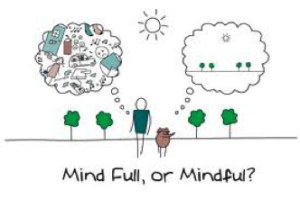
http://mindfulnessinschools.org/courses/b-for-teens/
Have you ever noticed how often you are lost in thought?
Have you ever driven somewhere, only to find out you ended up in the completely wrong location because your mind was elsewhere? Have you ever eaten an entire meal and realized you didn’t really taste anything? This is referred to as “autopilot”: when we go about our daily activities without actually being consciously aware of our moment to moment experience.
Often we become lost in thoughts or worries about the future, or in thoughts or ruminations about the past. Mindfulness is about noticing this mind wandering, and bringing the focus of our attention back to the present moment. This can be practiced through a body scan practice, sitting meditation, walking meditation, and every single daily activity. It teaches us to notice what is happening in our present moment experience without trying to make it different than it is. Mindfulness practice is about learning to relate differently to the difficulties in our lives. Instead of bringing the common instinct of resistance to difficult emotions, thoughts and sensations, mindfulness teaches us to instead approach these with curiosity and compassion.
This is a radically different way of approaching difficulties!
Most of us want to run the other way (literally or figuratively) when we feel, think, or sense something that doesn’t feel good. Problematic stress occurs when we want something to be different than it is, so when we practice bringing mindful awareness to these experiences, we end up reducing our stress significantly. Mindfulness does not mean passivity. It means pausing and bringing awareness, which allows for a conscious choice of how to respond to any given situation.
Check out this short video about BBC Culture Correspondent David Sillito’s experience of a mindfulness program.
Or consider reading the book “Mindfulness: Finding Peace in a Frantic World”. If you’re interested in participating in a Mindfulness Program, click here.
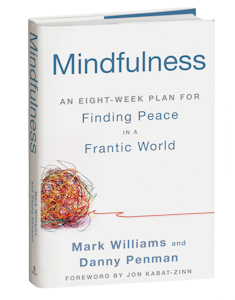
TEDx – Lissa Rankin explains the science of the mind-body connection
Check out this TEDx talk by Dr. Lissa Rankin, explaining the science of the mind-body connection, and the approach that Dr. Snider uses with her patients:
